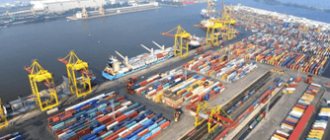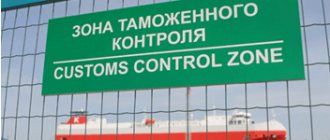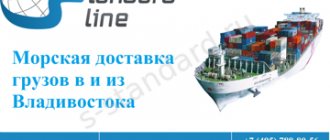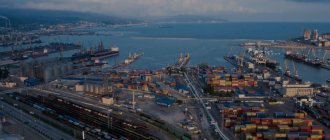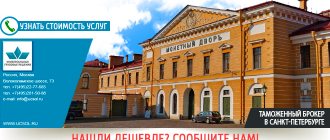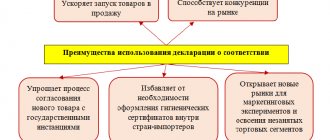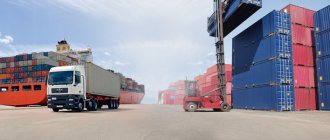Contacts and details
| Name | Customs post Bronka |
| Customs code | 10216160 |
| Organizational structural form | Customs authority (not specialized) |
| Customs clearance | produced |
| Parent's name | Baltic customs |
| Short name | t/p Bronka |
| Full address | 198412, St. Petersburg, Lomonosov, Krasnoflotskoye sh., no. 49, lit. B |
| Telephone | +7 |
| Website | https://sztu.customs.ru/folder/144389 |
| Working with ATA carnets | Yes |
| OKATO code | 40000 |
| SOATO code | 1140 |
t/p Bronka on the map
See also: Lomonosov, St. Petersburg, Customs posts
Why did the CED start working in Bronka, despite the order?
The idea to give the Bronka and Ust-Luga posts exclusive powers of documentary customs control for the declaration and release of goods belonged to the ex-head of the Federal Customs Service Andrei Belyaninov. It was assumed that the project would start on July 1, but on June 23, the day after a meeting with First Deputy Prime Minister Igor Shuvalov, the Federal Customs Service postponed the deadline for changing the structure of the Baltic customs by a month. At the same time, the very idea of creating a single EDC in Bronka caused dissatisfaction among industry participants. In July, large stevedoring companies proposed moving the EDC to St. Petersburg. The Ministry of Finance also expressed an ambiguous attitude on this issue. In its letter to Igor Shuvalov dated July 21, the ministry proposed to open the EDC in Bronka on August 1 only as a pilot project and, if it is successfully implemented, to gradually transfer the customs declaration competence of other Baltic customs posts there by February 1, 2021.
As a result, on July 29, Deputy Prime Minister Arkady Dvorkovich instructed the Federal Customs Service to postpone the start of work of the EDC in Bronka to October 1. But the deputy prime minister’s order was late: the service received it only on August 1, when the EDC had already started working. As reported by the Baltic Customs, they did not receive any instructions to postpone the start of the project (see Kommersant on August 3). Arkady Dvorkovich’s order also requires the Ministry of Finance and the Federal Customs Service to submit “comprehensive proposals to resolve the situation” by August 15.
Anastasia Vedeneeva
Customs broker services
- Personal customs clearance specialist;
- We prepare and execute the necessary documentation - declarations, applications, various permitting forms, documents, reporting;
- Recommendations on HS codes for goods;
- Preliminary calculation of customs value and amount of advance customs payments;
- Drawing up DT projects and related documents;
- Document flow with customs;
- Submission of information as requested by the Bronka Customs Post;
- Representation of the Customer's interests in the customs authorities of the Russian Federation;
- Organization, if necessary, of preliminary customs inspection of goods and vehicles before submitting the DT;
- Drawing up a declaration of intent under the seal of the customs representative;
- Consulting in the field of foreign economic activity (FEA);
Price
One consignment of goods is understood as a consignment of goods sent at a time to the consignee using one waybill in one vehicle within the framework of one foreign trade contract.
| Type of work | Cost without VAT) |
| Carrying out customs operations and declaring goods of one consignment in import mode (IM 40): - consulting; — checking the package of documents provided by the Customer for customs clearance of one consignment (including shipping documents); — formalization of delivery documents, preparation, filling out the declaration form and electronic submission to the customs authority. | from 5,000 rubles |
| Carrying out customs operations and declaration for each subsequent consignment in import mode, if there are several consignments in one vehicle (IM 40): - consulting; — checking the package of documents provided by the Customer for registration of one consignment (including shipping documents); — formalization of delivery documents, preparation, filling out the declaration form and electronic submission to the customs authority. | from 4,000 rubles |
| Registration of each additional sheet of goods declaration, starting from the 5th (fifth) product in the import mode (IM 40). | from 450 rubles |
| Carrying out customs operations and customs declaration of goods of one consignment in export mode (EC 10): - consulting; — checking the package of documents provided by the Customer for one consignment (including shipping documents); — formalization of delivery documents, preparation, filling out the declaration form and electronic submission to the customs authority. | from 3,000 rubles |
| Carrying out customs operations and declaring goods of one consignment (other modes): - consulting; — checking the package of documents provided by the Customer for customs clearance of one consignment (including shipping documents); — formalization of delivery documents, preparation, filling out the declaration form and electronic submission to the customs authority. | from 10,000 rubles |
| Payment (additional payment) of any types of customs duties under one DT on behalf and on behalf of the Customer, using the representative’s own funds through terminal payment using a customs card/online service of the ROUND payment system. | from 3% of the documented payment amount (additional payment), but not less than 1,000 rubles |
| Assistance in obtaining a Declaration of Conformity with the CU TR for goods, as well as other permitting documents. | discussed individually |
“Bronka” is being returned to gangster Petersburg
On the evening of June 8, the St. Petersburg publication Fontanka exploded an information bomb, reporting that the Nikulinsky District Court of Moscow satisfied the claim for the conversion of 100% shares in Phoenix LLC, the owner of the entire infrastructure of the Bronka port near St. Petersburg, to the state. The owners of the port, as reported by RBC, have already announced that they will file an appeal, but this is not even interesting - perhaps yesterday’s decision of the Nikulinsky court is only the first act of a multi-step combination to redistribute spheres of influence in St. Petersburg, which in its scale and impudence surpasses the most sensational raider captures from the “dashing 90s”.
Claim for 33 billion
The spring of 2021 brought a high-profile trial to St. Petersburg. According to media reports, the Prosecutor General's Office of the Russian Federation filed a lawsuit in the Nikulinsky Court of Moscow to convert 100% of the shares in Phoenix LLC, the owner of the land (120 hectares) and infrastructure of the most modern private port of St. Petersburg - the Bronka port, into state income. And the process became high-profile not only because of the “subject” of interest of the Prosecutor General’s Office (after all, it’s not every day in Russia that they try to “nationalize” infrastructure assets), but also because of the names of the defendants. Phoenix LLC is part of the St. Petersburg management company Bronka Group. The owners of the Bronka, as the publication writes, are “members of the family of retired FSB and FSO generals Nikolai Negodov and Evgeniy Murov.” These are very famous people in St. Petersburg. For example, Nikolai Negodov, as Forbes writes, started with Vladimir Putin in the Leningrad KGB, and Evgeny Murov headed the Presidential Security Service in 2000-2016. That is, these are individuals whom, in modern political realities, it is not customary to touch the word “at all” without compelling reasons.
Formally, to be completely correct, the Prosecutor General’s Office, in its application for securing the claim, initially wanted to seize the property of a long list of companies that were in one way or another part of the Bronka Group business empire (here are the Izmeron plant, the Unified Document Center, and the restaurant group, and much more), for a total amount of 33 billion rubles. As RAPSI writes with reference to the owners’ lawyers, “to secure the claims, the court applied interim measures directly related to the subject of the claims - exclusively in relation to the port property. Property of “Izmeron”, Spinning and Thread Mill named after. Kirov, the Unified Document Center and other enterprise owners are not affected by interim measures.”
The origin of the figure of 33 billion in the Prosecutor General's Office, judging by the documents posted on Fontanka, was calculated as follows: in the period from 2008 to 2014, the Federal State Unitary Enterprise Ateks of the Federal Security Service of Russia concluded at least 23 government contracts with companies, the beneficiary of which was the now liquidated Forum holding. – “Baltstroy”, “Stroykomplekt”, “Stroyfasadom”. Under these contracts, which involve construction and restoration work at presidential and government facilities (Gorki-9, Novo-Ogarevo, Bocharov Ruchei, etc.), Forum structures received at least 33 billion rubles. This figure is precisely indicated in the claim of the Prosecutor General’s Office against the current owner of the Bronka port, Phoenix LLC.
Deal with conscience
Let’s not waste time now on long discussions about whether the evidentiary base of the Prosecutor General’s Office is weak or strong; this issue has already been covered by the media. Something else is much more interesting: who benefits from the lawsuit for the actual nationalization of one of the most technologically advanced container terminals in St. Petersburg? And why did this lawsuit appear now? When answering these questions, several names are mentioned in the media, and the first of them is the former general director of the same Forum, Dmitry Mikhalchenko. The man whom some previously called the “24-hour governor” has now, as Moika78 notes, been in custody for more than five years. According to the publication, he was detained in March 2021 in the case of smuggling elite alcohol, then Article 210 of the Criminal Code “Organization of a criminal community” and theft on an especially large scale were added to it while carrying out work in the state residences already mentioned above.
The article is serious, taking into account the aggravating circumstances, Mikhalchenko “shines” up to 20 years in places not so remote. Considering that the entrepreneur is already almost 50, he may not live to see his release from prison, especially since in March 2021, as Fontanka reported, “Mikhalchenko suffers from a number of chronic diseases and during the period of his detention he sought medical help more than two hundred times." In addition, “it was established that the psychiatrist diagnosed the defendant with a specialized diagnosis,” the publication writes.
In general, Dmitry Pavlovich’s prospects are unenviable. Unless, of course, you choose the option of cooperating with the investigation. You don’t have to look far for examples: in the same case of embezzlement during the execution of state contracts at the Novo-Ogaryovo residence, as RBC reports, former deputy general director of Ateks Stanislav Kuner made a deal with the investigation and received 8 years in prison and a symbolic amount of 1 .5 million rubles fine (Küner was charged with Articles 210 and 160 of the Criminal Code).
Nobody knows what exactly Küner told the investigation (the case, as TASS writes, was heard behind closed doors due to materials classified as “secret”), but hardly anyone will be surprised if in 4-5 years Küner is released for exemplary behavior released on parole and will soon be found somewhere on the shores of Marbella or Mallorca.
Thus, Dmitry Mikhalchenko could be faced with an alternative - either go to prison for a long time (forever), or make a deal with the investigation. Or more precisely, let’s assume, to slander his former business partners in the person of the same Negodov, saying that everything received from state contracts - namely 33 billion rubles - was used for the construction of the Bronka port. Whether it was true or not cannot be said 100% sure. But further developments of events may convincingly indicate that Mikhalchenko could still have made a deal with the investigation (or rather, with those shadow players in whose interests the investigation is being carried out).
Get out of town
Now to the fun part. In parallel with the claim of the Prosecutor General's Office against Phoenix LLC, a second story is developing in St. Petersburg - about the withdrawal of port facilities from the historical center of the city. At the beginning of April this year, it became known about a letter from Transmashholding co-owner Andrei Bokarev to Russian President Vladimir Putin with a proposal to clear St. Petersburg’s access to the sea from the port. As RBC writes, on the vacated 600 hectares, the entrepreneur proposes to build luxury housing and commercial facilities in the amount of 4.8 million square meters. m. According to Bokarev, everyone should benefit from this: by optimizing logistics, current residents of the territory will be able to increase revenue from 130 billion to 1.5 trillion rubles per year, tax deductions to budgets of various levels will increase to 84 billion rubles, and the city will receive over 11.5 thousand jobs. As examples from world practice, Bokarev cites Hamburg, Rotterdam, London, Toronto and Yokohama, where similar projects have become points of attraction for residents, tourists and businesses. “For St. Petersburg, among other things, such a project will form the modern appearance of its sea façade and will specialize” in cargo such as coal, bulk cargo, and petroleum products. To receive tens of thousands of containers, roll-on, general cargo, etc., which mostly go through the St. Petersburg port, the construction of an impressive infrastructure and, as a result, multi-billion dollar investments will be required. And finally, the third problem is personnel: in small Ust-Luga there simply is not enough specialists to service the port business that has “moved” from the center of St. Petersburg. People won’t appear “just by clicking”: here it will be necessary to both invest additional billions in the construction of housing and social infrastructure, and lure specialists from the regions to Ust-Luga, which the owners of port assets in other constituent entities of the Russian Federation are unlikely to be happy about.
Tasty
The second transfer option is Bronka, which specializes in containers, general (goods in boxes, barrels and other packaging) and roll-on (automotive and agricultural machinery) cargo. The port began operating in December 2015 and in just a few years became the most modern container terminal in the North-West region. The port is actively investing in development - for example, only in Bronka there are two of the most powerful LHM-800 mobile cranes today, capable of lifting a load of up to 500 tons in pairs - no one else in Russia has this capability yet.
“Bronka” is located on the outskirts of St. Petersburg (in the Lomonosov district) and is the city’s only deep-water port, capable of receiving ships up to 340 meters long, up to 50 meters wide and with a draft of up to 13 meters. According to its development program, by 2025 Bronka will be able to handle up to 25 million tons of cargo. Plus, Bronka, judging by the company’s website, has joint plans with Russian Railways to build one of the largest transport and logistics centers in the North-West near the port. Plus, next to Bronka there are hundreds of hectares of free territory by the sea, which can easily accommodate all the current residents of the port in the center of St. Petersburg. The list of advantages, as they say, can be continued - the asset is truly “tasty”.
By the way, it was Bronka that officials at various levels initially considered as a promising location for relocating the St. Petersburg port. Back in 2010, as the portal “812online” recalls, Igor Rusa, who then held the post of head of the Federal State Unitary Enterprise “Rosmorport”, campaigned for such a development of events. He cited Helsinki as an example: previously, the capital of Finland implemented a large development project to remove almost 220 hectares of the port from the historical areas of the city. It took six years and 600 million euros. In return, Helsinki received territory for the development of expensive housing and fully repaid the costs. In 2021, the then governor of St. Petersburg, Georgy Poltavchenko, returned to the idea of moving the St. Petersburg port from the historical center. In an interview with RIA Novosti, he said that “St. Petersburg is losing development prospects” and “the city’s infrastructure is receiving unnecessary stress from the work of the port.” The ex-mayor proposed to withdraw the first and second areas of the port (approximately from the mouth of the Neva to the mouth of the Ekateringofka River) first and set aside seven years for this. The third region (where the road to the Turukhtannye Islands leads) and the fourth (to the Krasnenkaya River) Poltavchenko proposed to liberate later.
Dashing 2020s
Now let's move on to the final part of the combination. What will happen if the Prosecutor General's Office gets its way and the Bronka port, despite all the appeals of the current owners, is nationalized? It makes no sense for the state as an owner to keep such an expensive asset as a port on its balance sheet, with its hundreds of interconnected business processes: there is no doubt that the port will be privatized as quickly as possible. How privatization is usually carried out in Russia - I think no one needs to explain, and hardly anyone will be surprised if, for a maximum of 10-15% of the market value, the port will be transferred to a “strategic investor”, who will launch the process of transferring the port of St. Petersburg to Bronka " Also using public funds for this. For example, in his letter, Bokarev estimated investments in the development of the territory on the site of the Big Port at 440 billion rubles, of which only 6 billion rubles from the project operator. The remaining funds, in his opinion, can be raised through the use of the principle of public-private partnership with the participation of Vnesheconombank. That is, essentially, at the expense of the National Welfare Fund of the Russian Federation, the funds of which are placed on deposits with VEB. The matter, as they say, is pleasing to God: Russia is now increasingly competing with the Baltic ports for container transit between China and the EU. The new port in Bronka is guaranteed to become the center of project logistics in the North-West, which completely coincides with the interests of the Russian Federation and creates prospects for all domestic stevedores.
As for the land that will be freed up in St. Petersburg after the port is withdrawn from its historical center, it will be practically golden: according to the estimates of the head of the capital markets and real estate investment department of the company, Alexey Fedorov, as RBC writes, the potential value of the land that is now occupied by the Big Port of St. -Petersburg in the city, reaches 150 billion rubles.
Summarize.
It seems that before us is an actively played out combination, not only repeating in spirit the most daring raider attacks in the 90s, but in some places even surpassing them in the audacity of the plan. Watch your hands: we find a “sacred victim” who has nothing to lose (she could become Mikhalchenko), we agree with her to slander the owners of the target asset. Then, using connections with the Prosecutor General’s Office, we initiate a lawsuit alleging that the asset was allegedly built with corrupt money, we nationalize the asset, then privatize it for three kopecks, transfer the port from the historical center of St. Petersburg to it for public money, and use the vacated site for a global development project in second city in Russia.
At stake are not even billions, but trillions of rubles (it is no coincidence that in his letter to the President, Bokarev compares the port relocation project with the construction of facilities for the 2014 Olympics in Sochi in terms of the scale of investment). When so much money is at stake, you can even go against the Murov and Negodov family clans with their opportunity to become the top person in the state. At the same time, we are far from considering the co-owner of Transmashholding as the customer of such a large-scale multi-step project. But we would not be surprised if he could be chosen as the public face of the entire operation, and the real customers of the attack on Bronka are swimming in much deeper waters. More on this in the next part of the investigation.
Operating procedure
- Request. You leave a request in any convenient way: by phone, email or through forms on the website.
- Consultation with a specialist. We call you back and find out your task in the field of foreign economic activity and inform you of the price for customs clearance.
- Signing the contract. Agreeing on the terms of cooperation and signing the contract.
- Preparation of documents and certificates. Collection and preparation of the necessary permits for the import or export of your goods.
- Customs clearance. Submitting a declaration, resolving disputes and attending inspections and inspections.
